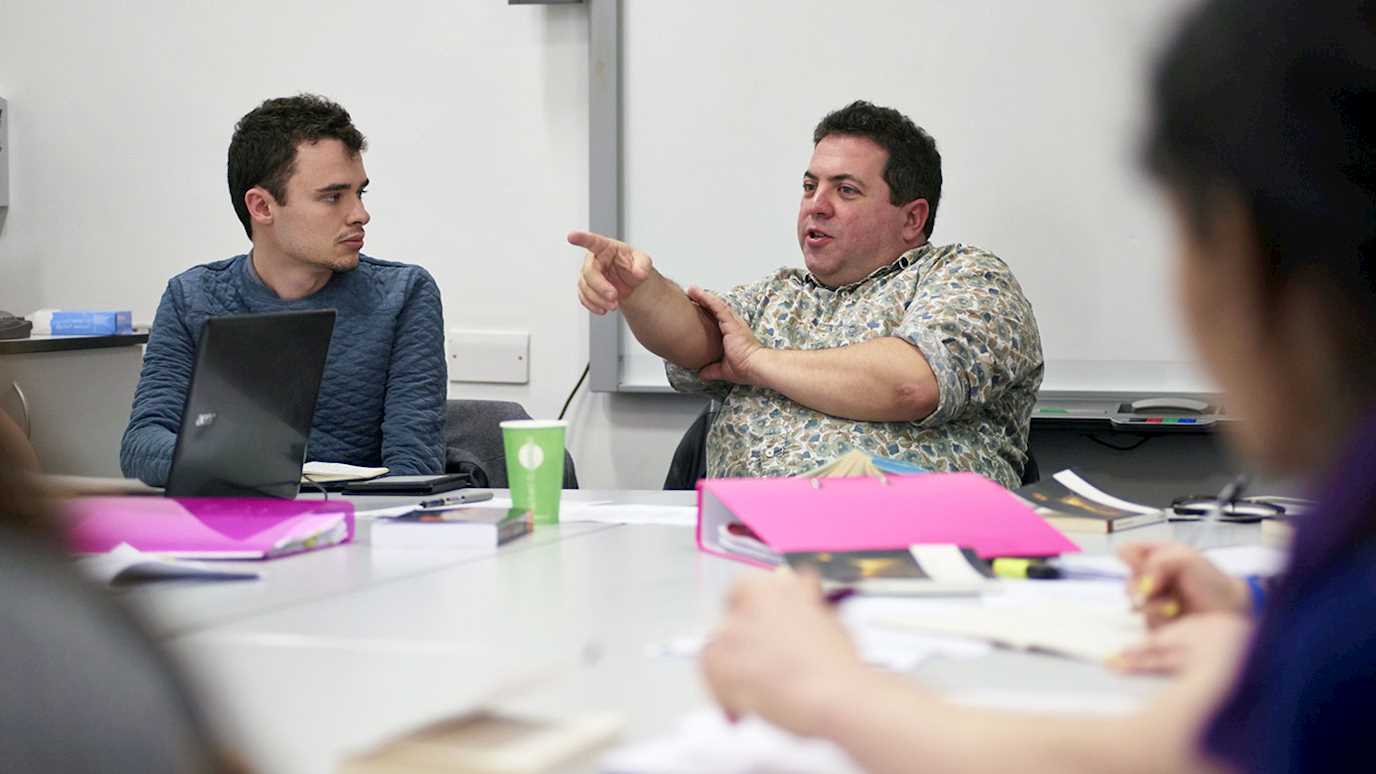Professor Robert Hampson on Heart of Darkness
Key points
- The narration is twice removed from Conrad. We have an unnamed narrator who introduces Marlow as the second narrator.
- The book draws on a range of quest narratives in Marlow’s ongoing search for Kurtz
- The title of the novel refers both to politics and psychology: it gives us an insight into what happens to Conrad’s characters as they progress up the Congo, as well as the treatment of the Civilising Mission’s treatment of the locals
- One of the paradoxes of the book is that Kurtz went out to Africa with honourable intentions, and yet became one of the worst and most violent colonizers.
- Marlow also discusses how the blank space of maps, having been named and populated, has become a form of darkness, under Western control
Quotations
- 'Marlow sat cross-legged right aft, leaning against the mizzen-mast. He had sunken cheeks, a yellow complexion, a straight back, an ascetic aspect, and, with his arms dropped, the palms of hands outwards, resembled an idol'
Heart of Darkness, p. 4. - 'Mr. Kurtz was at present in charge of a trading post, a very important one, in the true ivory-country, at 'the very bottom of there. Sends in as much ivory as all the others put together....'
Heart of Darkness, p. 19. - 'the International Society for the Suppression of Savage Customs had interested him with the making of a report, for its future guidance ... it was a beautiful piece of writing'
Heart of Darkness, p. 50. - 'It was not a blank space any more. It had got filled since my boyhood with rivers and lakes and names. It had ceased to be a blank space of delightful mystery - a white patch for a boy to dream gloriously over. It had become a place of darkness.'
Heart of Darkness, p. 8.
Further reading
- Digests written by Oliver Paynel
- Hunt Hawkins, and Brian W. Shaffer (eds), Approaches to Teaching Conrad’s ‘Heart of Darkness’ and ‘The Secret Sharer’ (New York: Modern Language Association of America, 2002).
A strong collection of twenty essays ranging over the novella’s interests, with a particularly percipient one on pedagogical approaches. Suffers from a hangover due to the African novelist Chinua Achebe’s vigorous attack on the novella but does offer several stimulating perspectives.
- Chinua Achebe, ‘An Image of Africa: Racism in Conrad’s Heart of Darkness’, The Massachussetts Review, 18.4 (Winter 1975); reprinted in R. Kimborough (ed.), Heart of Darkness (Norton Edition, 1988).
- Peter Brooks, ‘An Unreadable Report: Conrad’s Heart of Darkness’ in Reading for the Plot (Oxford: Oxford University Press, 1884).
- Thomas Dilworth, ‘Listeners and Lies in Heart of Darkness’, Review of English Studies, 38.152 (1987), 510-22.
This article demonstrates the central role that audience figures play in shaping narration in Heart of Darkness, and argues that the novel often conveys its truths through lies that are formed under the influence of, and reflect the ideological position of, these listeners.
As Kurtz abandons his ‘civilizing’ mission in order to perform the role of idol to his African tribe and lead them in violent raids, he accommodates their ‘savagery’ and further affirms the sense that the values he performs are those of his audience rather than his own. In his blindness, Kurtz finally ceases to see the candle’s flame and to be blinded by the ‘light’ of ‘idea’ of imperialism. Yet Kurtz’s proclaiming ‘The horror!’ of his experience might not suggest, as Marlow supposes, that Kurtz has rediscovered his former high ideals. Instead it is possible than he is, once again, producing what believes his listener (now the European Marlow) would like to hear, given Marlow’s presumed disapproval of his abominable behaviour. Though uncertain it is possible that Kurtz is entirely hollow and devoid of values and has died, as he lived, performing for his audience.
Women are central figures in the reciprocal relationships which shape narration. Kurtz’s passive relationship with his consort illuminates, if only obliquely, the sense that his Intended was the author of his European ideals. The article argues that Kurtz’s Intended represents the European audience as a whole, and is symbolic of their ideals in the same way that the ‘idea’ of imperialism is symbolised for Marlow by a light. When Marlow lies to the Intended (symbolic of all Europe) and substitutes the name of the Intended for Kurtz’s last words, his ‘cover up’ conversely reveals the truth about the ‘idea’ of imperialism: that it is a ‘horror’.
In another example, Marlow’s outspoken praise of imperial efficiency, most likely intended to accommodate the views of his audience of Liberal Imperialists and Social Darwinists, clashes with the brutal abandonment and death of African workers when they become ‘inefficient’ in the narrative’s events. In this way Conrad sought to reveal truths about imperialism by ‘accommodating’ his readers with falsehoods which his narrative shows to be false, asking his late Victorian audience to “know a lie when they hear one”.
- Robert Hampson, ‘Heart of Darkness and “The Speech that Cannot be Silenced”’, English, 39.163 (Spring, 1990), 15-32.
This essay traces different voices and languages across Heart of Darkness, using this discussion to consider the charge of racism against Conrad’s novel by Chinua Achebe.
It is rare for Conrad’s text to indicate when French is the language that is being spoken in conversations, and this lack of distinction suggests that these two languages are almost interchangeable and afforded the same status within the narrative. By contrast, Russian and African appear to hold lower positions in this implicit hierarchy of languages: Russian appears to Marlow as a code that he is unable to decipher, and African languages are expressed as sounds rather than as speech, closer to music in expressing emotion whilst lacking linguistic content. Yet, since other characters (such as the Russian) understand African dialects as discursive languages that are recognisably different from one another, this hierarchy of languages is, significantly, Marlow’s rather than Conrad’s.
Marlow’s ethnocentricity is also made evident by Conrad when he refers to European cultural references such as Walpurgis Night and in Goethe’s Faust in order to make sense of his experience in Africa. Through Marlow’s African encounters, Conrad is setting up European culture for analysis through its confrontation with Africa. The potential for equivalency between European and African cultures clashes is, furthermore, used by Conrad to challenge the sustained perception of Europeans as superior to Africans, and the ethnocentric views of his European readers.
The gap between Marlow and Conrad demonstrated in examples such as these suggest that Chinua Achebe has, in his criticism of Conrad’s racism, conflated Marlow with Conrad, and so overlooked the criticism of European perspectives that Conrad advances through characters such as Marlow.
Nonetheless, instances such as the African fireman’s understanding of European technology as embodiment of an evil spirit – a typical Victorian trope – demonstrate that Conrad, as well as his character Marlow, made use of racist and imperialist stereotypes and modes of representation. Heart of Darkness succeeds in subverting colonial myths, but fails to challenge the myth of racial superiority.
The article agrees with those critics who argue that Heart of Darkness did nothing to remedy the inadequate representation of African culture and history in European writing. Instead, and much like Edward Said’s Orientalism, Heart of Darkness draws into view ‘the power-relation between Europe and Africa and holds up for analysis the European discourses produced in that context’ (p. 25).
Heart of Darkness is, then, an instance of the modern dialogic, reflexive form of anthropology that questions and acknowledges the complexities of studying other cultures whilst also being inescapably situated within a culture oneself. As anthropologist James Clifford had it, Heart of Darkness is ‘a paradigm for ethnographic subjectivity’: its value ultimately lies in enabling white European readers and Western ethnographers to come to terms with their imperialist past, and with the problematics of adequately representing other cultures.
- Robert Hampson, ‘Joseph Conrad: Postcolonialism and imperialism’, EurAmerica 41 (2011): 1-45. (Available online via PURE).
- Andrea White, ‘Conrad and Imperialism’ in J.H. Stape (ed.), The Cambridge Companion to Joseph Conrad (Cambridge: Cambridge University Press, 1996), 179-202.
This chapter in the The Cambridge Companion edition devoted to Conrad discusses the author’s complex views on imperialism, and their reflection in his work and its surrounding criticism.
Exiled from Poland as a young boy, Conrad saw his own family as victims of Russian imperialism, and his personal history made him particularly sympathetic to other victims of imperial intrusion. Although often in dependent positions, Conrad depicted natives as indefatigable: his early story ‘Karain’, for instance, stressed the inevitability of native resistance alongside the unnaturalness and madness of European invasion.
The most common arguments made for Western expansion in Conrad’s time were based in arguments for social evolutionism proposed by anthropologists and sociologists such as Benjamin Kidd. Inspired by Darwin’s insights but greatly developed, arguments for ‘progress’ led Western society to conceive of continued expansion by ‘advanced’ nations and their control of ‘primitive’ people as part of a natural evolutionary process. So extensive was the embrace of the logic of ‘progress’ among Western elites that glaring contradictions were overlooked; for instance, Darwin’s insight that the ability to survive was the most basic characteristic of evolution, and not an inexorable march towards civility. By contrast, Conrad’s fictions portrayed European outposts as fatal disruptions of the natural order and effectively refuted attitudes that served to naturalize native inferiority and justify the project of European domination.
The most common arguments made for Western expansion in Conrad’s time were based in arguments for social evolutionism proposed by anthropologists and sociologists such as Benjamin Kidd. Inspired by Darwin’s insights but greatly developed, arguments for ‘progress’ led Western society to conceive of continued expansion by ‘advanced’ nations and their control of ‘primitive’ people as part of a natural evolutionary process. So extensive was the embrace of the logic of ‘progress’ among Western elites that glaring contradictions were overlooked; for instance, Darwin’s insight that the ability to survive was the most basic characteristic of evolution, and not an inexorable march towards civility. By contrast, Conrad’s fictions portrayed European outposts as fatal disruptions of the natural order and effectively refuted attitudes that served to naturalize native inferiority and justify the project of European domination.
In his African novels, for instance, ‘An Outpost of Progress’ depicts white imperialists Kayerts and Carlier as such damaged characters that they depend on native bookkeeper Makola to run the company’s ivory collecting business and on neighbouring chief Gobila for their meals. Similarly in ‘Heart of Darkness’, notions of ‘progress’ are replaced by the reality of the aborted railroad and native chain gangs. Conrad’s works also uncovered tactics such as obfuscation through complex bureaucracy that were necessary to legitimize imperial acquisition.
Whilst many agree that Conrad’s work is most interested in the psychology of the colonialist, critics also argue that the backgrounding of native peoples in this pursuit is highly objectionable. Yet whilst some present-day readers now criticize the same works for their conservatism and ideological ambivalence, Conrad was operating within a conception of culture as a single evolutionary process cannot be overlooked. The fact that he contested the serene confidence imperialism to the extent he did sets him apart from novelists of his time and against the literary tradition that he was writing within.
Conrad’s writing was instructive to colonized peoples, affording new consciousness of exactly what it meant to be colonized by Western powers. Heart of Darkness significantly also inspired E.D Morel’s Congo Reform Movement. Himself originally emerging from a family that suffered under colonial domination, Conrad destabilized the exclusive European telling of the world’s story, and had a great influence on the ‘writing back’ of colonized peoples following the independence movements of the 1950s and 1960s; a range of postcolonial writers now claim him as ‘one of us’.
Web links
- The Victorian Web provides a rich array of resources, including a chronology and articles on Conrad’s works
- In Our Time BBC Radio 4 programme on Heart of Darkness
- The OUP project Writers Inspire has some resources on Conrad, with an emphasis on post/colonialism
























